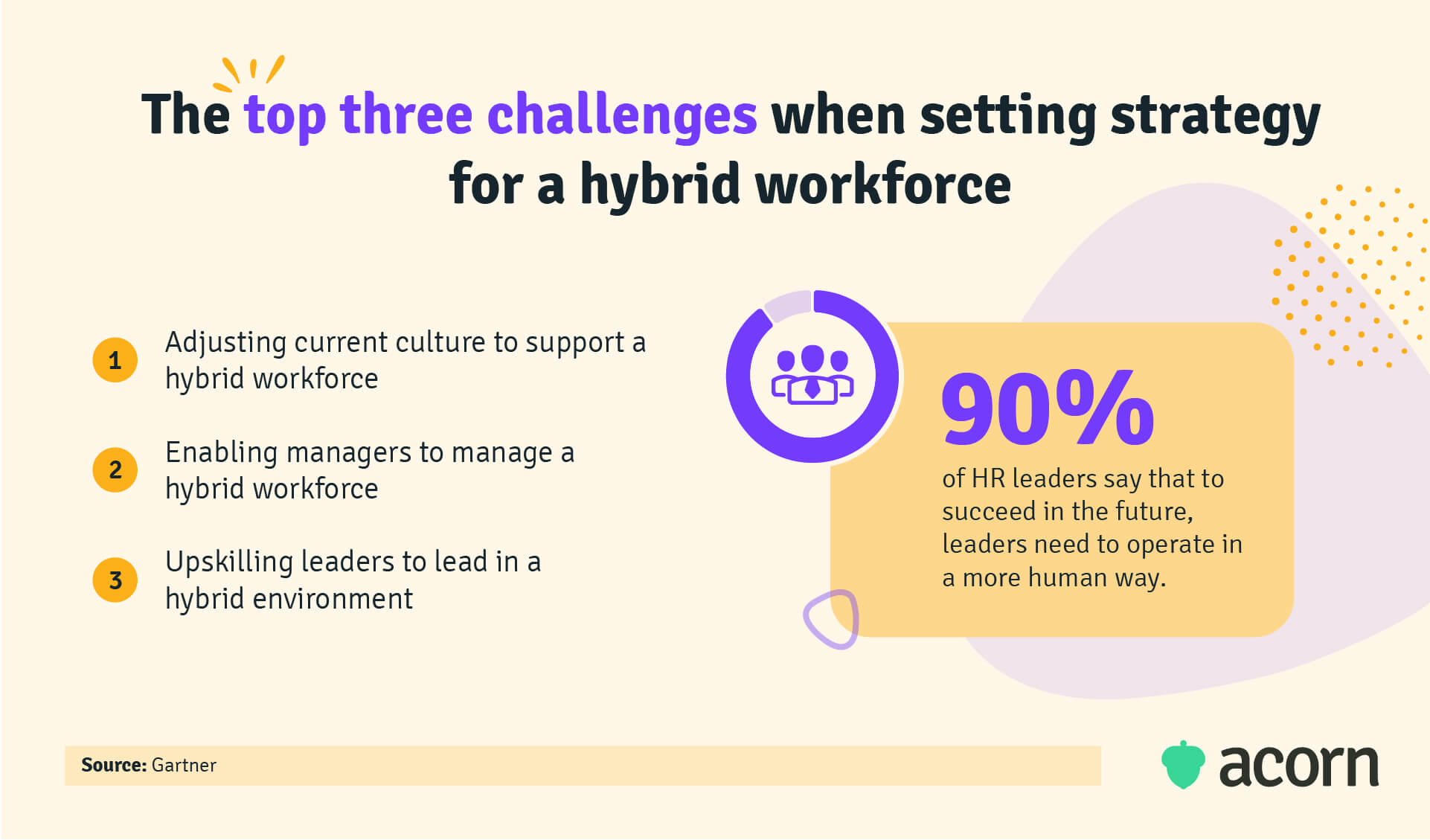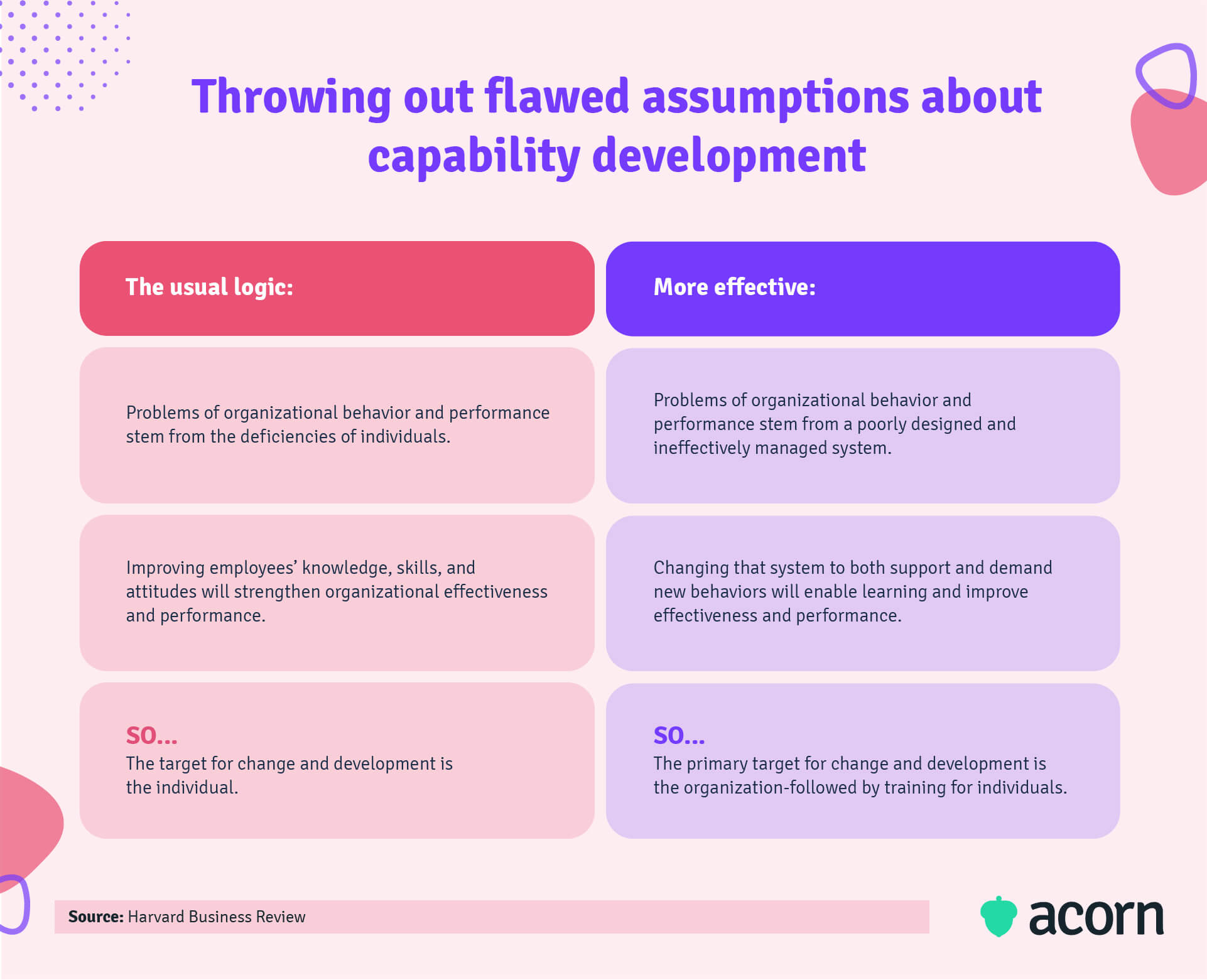The Vital Role Mentoring Plays In Developing a Future Leader
Reading Time:

Lead the pack with the latest in strategic L&D every month— straight to your inbox.
SubscribeMentoring a future leader can play a major role in shaping their success and development within your org.
The mentoring leader guides a mentee elsewhere in their organisation. Think a Chief Marketing Officer mentoring a junior design associate—the aim is to present a different point of view for a mentee who is early in their career.
So, how do you ensure you’re getting the best benefits of leadership mentoring?
What is the role of a mentor?
A mentor acts as a guide for a mentee or protege by way of motivation, guidance and emotional support. Mentors may help progress a career, advance a network or set goals through a long-term relationship with their mentee.
What is mentor leadership?
Mentor leadership is the process of providing a mentee with greater business perspective. It’s more a type of mentoring than a specific leadership style, considering its aim is to expose the mentee to new ways of thinking from outside of their function.
What’s the difference between a mentor and a leader?
Leadership is generally a formal role within a hierarchy while mentorship can happen within or outside of your organisation.
Each offers a host of advantages for beneficiaries.
- Leadership is crucial for accountability. Leaders will roll up their sleeves and get the work done. If need be, mentors nudge a mentee along their path, creating a cascade of accountability.
- The mentoring experience is generally considered more personal, better enabling individual development.
- Leadership is for the most part directional, which is key for executing strategy through day-to-day prioritisation in teams.
- Mentoring inspires and encourages autonomy. That leads to improved self awareness and a resilient workforce.
What really seals the deal on leadership, mentoring, and mentoring leaders is the right tools to support them. We pioneered the performance learning management system (PLMS) to both guide your employees step by step to master the capabilities needed to succeed and facilitate and capture knowledge transfer. So not only can you develop leadership capabilities in line with organisational performance, but you’re able to capture key interactions between mentors and mentees and create shareable learning assets to promote knowledge exchange at scale.
How does mentoring help develop future leaders?
Mentoring, in its purest form, is predicated on sharing context and experience. People are able to contribute more effectively when they understand their place in the organisation’s strategy—though when sequestered in one’s function, it can be hard to build that understanding yourself.
That’s where mentoring comes in. Aside from broadening functional perspective, it helps shape a better culture for leaders to develop in.
Managing workplace changes
Gartner notes that hybrid work, social and economic turbulence, and a growing reliance on digital dexterity will continually change the workforce in the next ten years.

Navigating that is hard enough for ICs, let alone those stepping into leadership positions. A mentor can help boost a mentee’s confidence in taking on more responsibilities through strategic expertise. Mentors can also vicariously revisit mistakes and learn a more refined solution for them, which only benefits the mentee.
Decision-making autonomy
Access to strategic information helps employees do their jobs more effectively, considering they have a more holistic view of the organisation’s health.
Mentor leadership therefore gives mentees the insights that enable them to make better decisions. It also ensures key information isn’t siloed within functions or by leaders, removing barriers to productivity.
Real-time feedback
We’re not saying you should throw out formal modes of training. But automated grades in an online course don’t always provide the nuance learners need to affect behavioural change.
Both mentors and mentees can benefit from discussion in their relationship. A mentor is able to course correct wayward problem solving or emotions in the moment for mentees, which creates learning opportunities in the moment of need and validates the mentor’s leadership capabilities.
Uncover high potentials
High potential employees aren’t always outright stars; many have to be coaxed out or put in the right conditions to thrive.
Mentoring leaders can create sandbox environments for mentees to fail safely, both mentally and consequentially. Whether mentees are working on multi-team projects or buddying up with a junior peer, on-the-job training is a tried and trusted method for ensuring leadership training sticks.
The benefits tacked on here are near-endless: Mentees can figure out their style of leadership, and they’ll gain valuable insights into implementing strategies, executing decision-making and confidently connecting with others.

How to implement effective mentoring
We’d like to note here that leadership mentoring can and should be an informal practice in the day-to-day of teams.
But when creating formal programs to develop leaders, leadership mentoring is a critical undercurrent for success.
1. Create targets
Mentoring is often considered more laissez-faire in its outcomes compared to development programs. But leadership mentoring has a specific goal: Develop leadership skills.
Generally, the targets here are tasks that the mentee will eventually assume from the mentor within a specified timeframe.
As this is a mentoring program, let the mentor co-design this with their mentee. An effective leader will know what a junior mentee will need to take on to move into a new position or simply progress in line with career or workforce planning. Dialogue at this stage gives the mentee an opportunity to air concerns and advocate for their own interests, which only serves to foster engagement and self awareness.
2. Utilise systems of support
Becoming a leader means taking some risks and juggling new responsibilities. An IC stepping up to people management for the first will be a better leader if they know their mentor and organisation account for mistakes (and themselves more forgiving of them in others, too). In short: Set them up for success.
Encourage mentoring leaders to maintain momentum with:
- Regular catch ups. This can be to discuss prioritisation, hurdles or upcoming handovers.
- Networks. Introducing mentees to other business leaders or potential mentors only strengthens cross-functional relationships and knowledge. It also takes the pressure off the mentor to be all things to their mentee.
- Formal courses. Short online courses and third-party workshops are necessary to add theory to leadership development.
Account for mentors and mentees who work remotely, too, with collaboration tools and learning technology that can track capability development.
3. Schedule evaluation
Any good training program will leave space for learners to provide feedback on their experience and L&D leaders to determine efficacy.
Look to your existing learning tech to supercharge this part of the process. Capability development can be managed within the system, which makes it easier to map supplementary content to certain stages of the program and track proficiency. Mentor and mentee should also sit down and discuss what went well and what could have gone better. It’s valuable insight for the mentor to adapt their guidance for other mentees in future and ensure a mentee has achieved all targets.
How a leadership mentoring program helps current leaders
Before we sign off on this one, mentoring shouldn’t just be about emerging leaders. Leadership mentoring has benefits for both sides of the action, bolstering leadership programs for current leaders.
- Mentoring validates their existing soft skills and leadership identity.
- Reverse mentoring ensures your leaders are always gaining new knowledge about your external environment.
Validate leadership skills
Ideally, mentors and mentees will bring different perspectives to the table. But that can make emotional labour harder for new leaders or cause them to double down on poor leadership skills. Left unchanged, lacking emotional support can affect employee confidence, team morale and retention rates. It also sets a poor standard for your oncoming leaders, too.
Encouraging leaders to mentor or be mentored helps validate or correct their approach. In this way, it’s a bit like holding a mirror to your leaders. Mentorship also encourages self reflection by default, creating more effective leaders that only serve to strengthen a key organisational level. The Conversation found that continued mentoring contributes to if mentors see themselves as a leader and how confident they are in leading others.
Broaden environmental understanding
The best leaders know that they can’t and don’t know everything, while individual contributors don’t always know how to confidently articulate their skills without experience. That’s where reverse mentoring comes in.
General Electric was famous for pairing senior and junior associates to bulk up the former’s tech savvy. But this is not to say your top executives are old and out of touch. Sometimes, their niche experience in industry or particular roles prevents them from having their finger on the pulse of your market and environment.
A Gen Z graduate could be matched with a VP 30 years into their career to advise on digital trends. It works across many fields—marketing, finance, sales—making it both a DE&I and digital transformation initiative, as a handy aside.
Key takeaways
Leadership mentoring can help emerging leaders understand the multi-functional ecosystem in an organisation.
Future leaders aren’t born from a one-off exercise. They take time to hone, which is why pairing them with a mentor outside of their function helps to create more well-rounded and strategically minded employees.
Mentor leadership provides hands-on experience to improve leadership proficiency, broaden functional perspective and uncover hidden high potentials. Plus, it helps mentors become better leaders by validating their skills and exposing them to new perspectives.